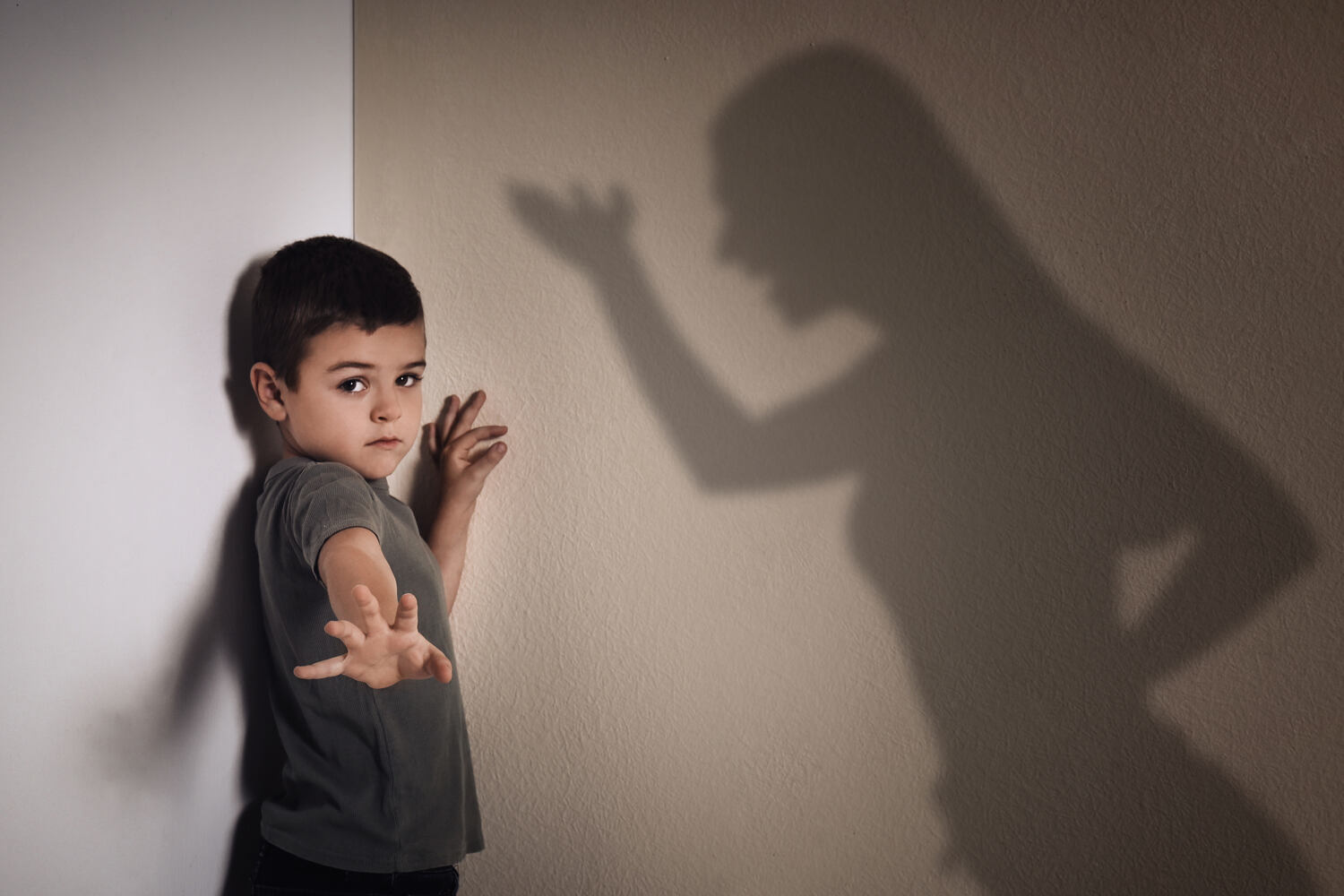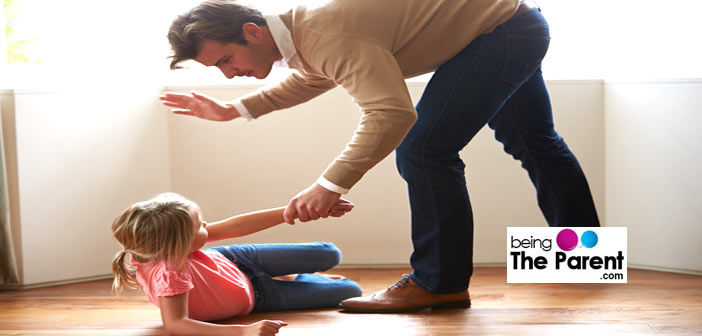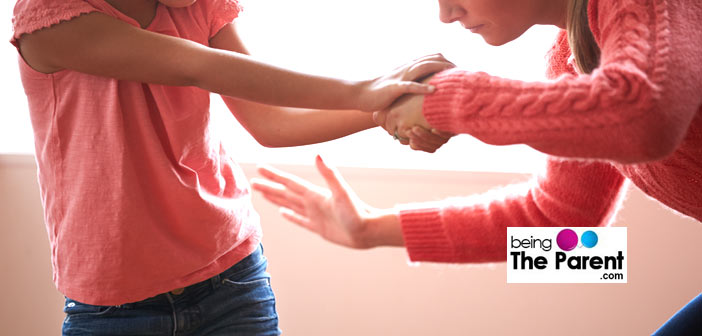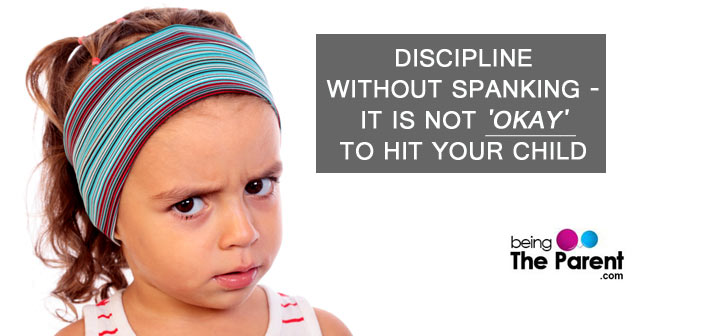
“Punishment is the root of violence on our planet.”-Marshall Rosenberg
Before you became parents, you might have encountered many instances where you saw a parent spanking a child to stop him/her from misbehaving. Many of us would have sworn then that “I would never ever raise my hand on my children and would find other loving, non-violent ways to discipline then.”
Looking back, you might think that was an inane and unrealistic promise. What should you do when your toddler hits another in the play area? How can you stop your pre-schooler from throwing a fit at the toy store? What do you when your school-goer refuses to obey simple instructions time and again? And how could you possibly stop your teenager from slamming the bedroom door close after every disagreement? How could you possibly not spank them, right?
Whenever your children misbehave, your knee-jerk reaction is to react the same way you were reacted to by your parents when you misbehaved. Yelling at them, boxing their ears or hitting them. This probably is not the best way to discipline them. Your children needs your love and understanding always, more so when they least deserve it.
Side Effects Of Hitting Children
“When a child hits a child, we call it aggression
When a child hits an adult, we call it hostility
When an adult hits an adult, we call it assault
When an adult hits a child, we call it discipline.” – a child psychologist Haim G. Ginott famously quoted once.
If you were spanked as a child, you’d probably hold it ideal to spank yours. Infact, more than 60% of parents think that hitting or spanking a child is okay for kids in the age group of 1 to 3 years. A research claims that parents who were not hit or spanked during their childhoods are less likely to spank their own kids. Research also claims that children who are not spanked and set into a disciplines mode with alternative disciplining strategies, turn out better individuals when they grow up. On the other side, a child who has been punished regularly for his misdeeds for disciplinary issues is likely to be emotionally unbalanced and their behavior degrades further.Spanking as a way to establish authority has a negative impact on children.
5 Reasons To Think Before You Hit Your Child
-
- Your children model after you. When you spank them, you are indirectly sending out the message that it is OK to spank others when one is angry, especially those who are smaller than oneself
- For older children, spanking is quite embarrassing. When was the last time you were embarrassed by someone and you actually wanted to listen and respect that person? Spanking can result in your child becoming angry enough to retaliate or it can make them insecure enough to grow up with low self-esteem
- Sometimes your child is misbehaving to seek attention. By retaliating in such scenarios, you are reinforcing your child’s belief that misbehavior will attract attention. This will only increase such behavior

- Your child is smarter than you think. “I got spanked for snatching the toy car from another boy today. Fine, next time I will do it when mom is not looking”. Spanking doesn’t teach them WHY what they did was wrong, it only shows them the immediate trouble they get into. This again doesn’t help them learn right from wrong in the long run
- And the most obvious one. You do not realize how strong you are and how small they are. When you hit your child in a fit of anger it can harm them physically. Their pain and your guilt – it is definitely not worth it
The only result that comes from spanking is probably immediate compliance, nothing beyond that. Children who get spanked from their parents tend to have defiant and aggressive attitudes, coupled with temper tantrums and taking out their frustrations on other children by physically hitting them. We are sure you’d like to discipline your child the other way.
How To Discipline A Child Without Spanking?
So yes, you do know that spanking is just not an ideal parenting technique. It can hurt your child, bith physically and emotionally, and may hamper your relationship. This is all good. But at the end of the day, it is also important to discipline them.
So how can you effectively discipline your child without hitting him?
While children of different ages should be disciplined using different tactics, there are 3 universally applicable alternatives to hitting the child.
- Isolation: Isolation refers to separating your child from his act of misbehavior. Like a time-out. Create a time-out area or a “naughty chair” where the child would be sent to for a few minutes if he/she misbehaves. The problem with this technique is that it is a difficult concept for smaller kids to comprehend. The advantage is that it gives your child (and yourself) some time to reflect on his/her behavior. In fact, you can even make it a “time-in” and join your child and calmly discuss the actions. This will ensure your child (especially if they are smaller) does not feel alone or abandoned
- Deprivation: Deprivation works from toddler-age to teenage. Take away from them something they love for a period of time. It could be a toy for a toddler, TV time for a pre-schooler, a football game or a sleepover night for older kids. The key is to keep the deprivation big enough for your child to feel the pain and realistic enough for you to execute it. For instance, “if you do this, I will never take you to your football classes ever again” might not work. Because well, you will eventually take him/her to the football classes and then your child would end up thinking your threats are never serious
- Reparation: This works especially good for older kids as their logical and reasoning skills are stronger. This basically involve your child “righting a wrong” they just did before they do anything else. Your child should be made to understand clearly (in a calm yet assertive way) why their actions were not desirable and how they can correct their ways. This is the epitome of effective disciplining – you are teaching your child to self-discipline and this would develop a strong moral sense in them as they grow up
(For more on these three techniques, please refer to the book “Stop the Screaming: How to Turn Angry Conflict with Your Child into Positive Communication” by Carl Pickhardt)

Other Effective Techniques To Discipline Your Child Without Hitting Can Be:
- Explain the consequences: Explain, do not scare your child. Provide logical explanations and let him know the natural consequences.
- Distract: You can use this strategy with young kids whose attention span is pretty less. Distract the child out of a difficult situation to something appropriate. Here you need to ensure that the alternative is as exciting and attractive as the current task your child is into.
- Reward and recognize: If bad behavior cannot go unnoticed, then why should good behavior not be mentioned? Make a reward and recognition policy wherein your child gets a motive to behave better. Rewards need to be emotional, not materialistic.
- Positive Discipline: If your child has done something wrong and has not liked the consequences, then he can be made to learn the right way. This strategy sees misbehavior as an opportunity to teach new behavior.
- Expel negativity: Rule out negativity in your language and feelings. Instead of stressing on “Dont’s” stress on “How about this instead?” Will work well.
Disciplining Children By Age Groups
Tips for discipline by age groups
- Babies (0-1.5 years): When they are very small and immobile, they really do not require much disciplining. But fixed schedules and routines are known to make the babies feel secure
- Toddlers (1.5-3 years):
- These guys are extremely mobile and exploratory, but lacks the good judgment to understand what is dangerous and wrong (the terrible twos!). While it is almost impossible to lecture them, you can do small things – like not picking up or hugging them for sometime (which is a major “deprivation” for them)</
- You can also appreciate them whenever they stop themselves from doing something that you have said “NO” to.
- Pre-schoolers (3-5 years):
- While they still need supervision, they are old enough to follow rules and instructions. Ensure that you and your child both identify and agree on actions and behaviors that are strictly not OK
- Once rules are established, time-outs and deprivation can be used if your child disobey them. However, it is important to give them a second chance. For instance, the first time they disobey, tell them that next time they do so, you will give them a 10 minute time-out during play time. If they repeat their misdeed, then impose a time-out
- Similar to toddlers, appreciation and praise works for this age group too as a means of motivating good behavior

- School-goers (6-12 years):
- Be a good role model. They will want to emulate your behavior.
- This is a good age to teach cause and effect. For example, if they refuse to wear a sweater for an evening walk, let them do so (but carry it with you). They will feel cold, realize they were wrong not to wear it. This is the time to explain to them how sweater keeps them warm and like a magician take it out of the bag!(You need your moments too! But try not to gloat ? )
- Always explains to them the consequence of doing something. And be consistent about it. If you have asked your child not to watch TV after 8 pm, then you should also not watch it at that time. “We are big so it is ok” does not go well with discipline as it breaks consistency in their minds.
- Teenagers (13-19 years):By now you would have set the ground rules and your child would mostly know what is approved and what will invite punishment. However this is a rebel age too.
The key is to:- Openly communicate with your teenage kids
- Not punish them in front of their friends or relatives
- Avoid “lectures”. You didn’t like it as a teen, they won’t either
- Ensure rules are realistic and fair
- Again, be consistent
Happy Disciplining! Happy Parenting!

